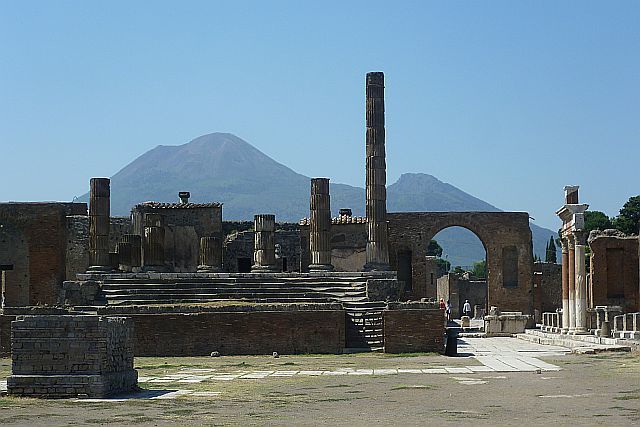During the First Century, war and illnesses were common killers in the Roman Empire. However, in the year 79 CE, Mount Vesuvius would show the city of Pompeii that a natural disaster could bring as much devastation and destruction as anything else.
In the decades before Mount Vesuvius engulfed Pompeii in ashes, an earthquake had struck the region. While the earthquake did not devastate the region, people there did not comprehend the amount of death and destruction that a natural disaster was capable of. In 79 CE, the beautiful and thriving city of Pompeii in the Roman Empire was a popular location for the wealthy and merchants to flock to. Historians have placed the population of Pompeii and neighboring region between 10,000 and 20,000 people. 1 Unfortunately, in the month of August, the city of Pompeii would be transformed from a jewel to ruins by one of the most powerful and devastating natural forces: a volcanic eruption.

Although nature provided warning signs of the catastrophic event that would soon follow, people were not able to comprehend them. Animals were dying because of their lungs being filled with toxic gas, a strong odor filled the countryside of Pompeii, and worse of all, earthquakes rattled the ground below as a result of the pressure from the magma.
On the morning of August 24, 79 CE, a strong blast from Mount Vesuvius that resulted in smoke arising from the crater drew people’s attention to the volcano, but the people of Pompeii did not panic or evacuate. Worse was yet to come. Around noon, the second explosion took place. This explosion was much stronger. A mushroom cloud shot into the sky at a distance of 27 miles. The explosion was estimated to be 100,000 times stronger than the bomb dropped on Hiroshima.2
The eruption that caused the mushroom cloud was so strong that it could have been witnessed hundreds of miles away. Pliny the Younger, an eyewitness, was so horrified and amazed by the cloud that he could not help but describe it in awe:
A cloud, from which mountain was uncertain, at this distance (but it was found afterwards to come from Mount Vesuvius), was ascending, the appearance of which I cannot give you a more exact description of than by likening it to that of a pine-tree, for it shot up to a great height in the form of a very tall trunk, which spread itself out at the top into a sort of branch.3
For those who decided not to flee Pompeii in the wake of the eruption, death was almost certain. As the eruption lasted a day, every passing hour meant more ash and toxic gas. If somehow people managed to survive breathing the toxic gas, the volcanic ashes were sure to kill them. Since structures in Pompeii were not built to carry as much weight as the ash covering them, many structures collapsed, resulting in the deaths of people who found refuge in them.
By the time Mount Vesuvius stopped ejecting ash and toxic gas into the air, ash covered Pompeii. The entire city of Pompeii was gone. What once was a vibrant city was reduced to a pile of ash. In fact, to this day a third of the city remains in ash. Although Mount Vesuvius has not erupted since 1944, an eruption is imminent; hopefully the destruction of the next eruption will not be as severe as the one in 79 CE.
- Encyclopedia Britannica, September 2016, s.v. “Pompeii Ancient City, Italy,” by Wilhelmia Feemster Jashemski. ↵
- Encyclopedia Britannica, September 2016, s.v. “Pompeii Ancient City, Italy,” by Wilhelmia Feemster Jashemski. ↵
- Charles W. Eloit, The Harvard Classics Volume 9 (New York: P.F. Collier & Son. 1909-10), 285. ↵



68 comments
Daniel Gimena
The story of Pompey and Mont Vesuvius has always captivated me.
I can ratify what the author says, if you visit Pompey, you will an extreme developed village for that time, destroyed by ashes.
It is terrible what those people experienced on that August day, as they didn’t know what was happening, and what it meant.
The story of Pompey was the one of the firs known stories that remember us that it don’t matter how powerful we think we are, nature has always the last word. Nature can produce a volcanic eruption, killing thousands of people, and after a couple of days nothing seems have happened for nature.
Sabrina Drouin
This story is truly heartbreaking, it’s crazy to think about how many people’s lives were lost this day, considering Pompeii was such a thriving city. I’m not sure what they could’ve been able to do, except watch in awe. Stories of natural disasters have always captivated me, but it is always sad to hear that they couldn’t do anything to save themselves, especially since they couldn’t have known better.
Daniel Matheu Baldor
I have always been interested in this topic. Reading this article, you realize how vulnerable humans are, and how an entire city can be destroyed by an eruption of a volcano. I can’t imagine what people were feeling when they listened to that huge explosion, followed by a large smokescreen. There have been some other important events similar to this one, but people will always remember this one.
Meadow Arriaga
It is crazy to imagine how developed humans are with technology. In the year of this tragedy, 79 CE, there is no way these people could have been aware or warned of the danger coming. Ignoring the previous natural warning signs caused dramatic death rates. For the outsiders witnessing, it must have been surreal. They lived to experience a monumental tragedy first hand.
Amanda Quiroz
I remember reading a story about this volcanic eruption and being so interested in both the topic and the emotional story it was told through. Then I remember watching a documentary about Pompeii and its people and city covered in ash by Mt. Vesuvius. Thinking of another eruption is scary and shows the strength of natural disasters, which we have no control over.
Vanessa Quetzeri
I recently visited Pompeii, it was one of the most interesting places I got to see in Italy with an amazing yet, tragic story. This wasn’t mentioned in the article, but I was told that people at the time believed that the natural disaster occurred due to the amount of sin occurring within Pompeii. That was the only explanation they had to such a massive natural disaster; it is alarming and sad that most people didn’t flee due to lack of knowledge over such an event. I cannot imagine the occupants of the city watching their home become engulfed as they too are buried under ash.
Kristina Tijerina
The city of Pompeii is something I find so interesting to read about. A whole city just turned into heaps of ashes from an extreme eruption. It’s horrifying to think about what the people of Pompeii went through during the time of the eruption. It leaves you wondering why they didn’t leave after the first eruption, when they noticed animals starting to die, or when they noticed a strong odor in the city. There were many warning signs before the eruption, and the people of Pompeii just didn’t pay attention. It’s fascinating that a third of the city is still covered in ash, and it’s scary that there could be another possible eruption.
Emmanuel Ewuzie
This article demonstrates how truly minuscule and vulnerable we as humans are. Decades of history gone within a day. As I write this, Hurricane Dorian is causing mass destruction and casualties in the Caribbean. No matter how much we advance to this day we are still at the mercy of Mother Nature. She continues to remain supreme.
Yazmin Garza
What an unfortunate event for the people living in Pompeii at the time, but what a lucky discovery for the archeologist that discovered it hundreds of years later. The event was tragic, but it has led to a deeper understanding of what life was like at the time in ancient Rome. The ash and volcanic rocks did an amazing job at preserving the life of the people of Pompeii. It was a valuable discovery, and I am glad that the people of Pompeii are being honored in their death for their contribution to history.
Christopher Hohman
Nice article. The the destruction of the city of Pompeii was a great tragedy in the history of the Roman Empire and also the world. It is sad that the people of ancient Rome had no way of knowing that the eruption would occur. There were a couple of warning signs, but they had no idea that they were warning signs at all. It is good that people today can have warning signs. It is cool however that when they uncovered Pompeii it was still largely covered in ash and thus it was well preserved